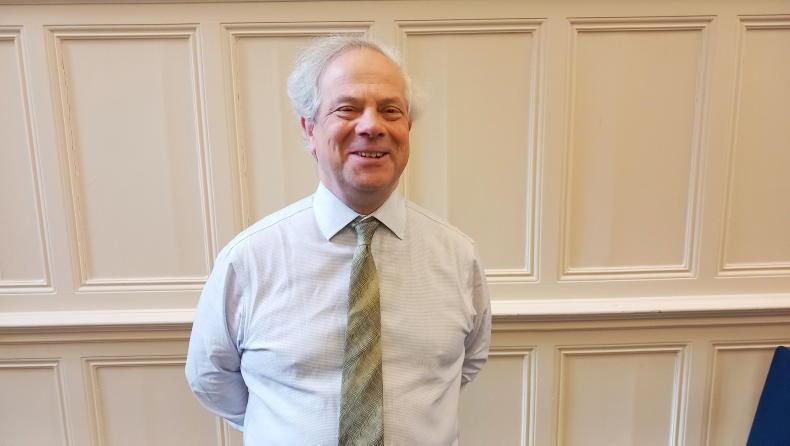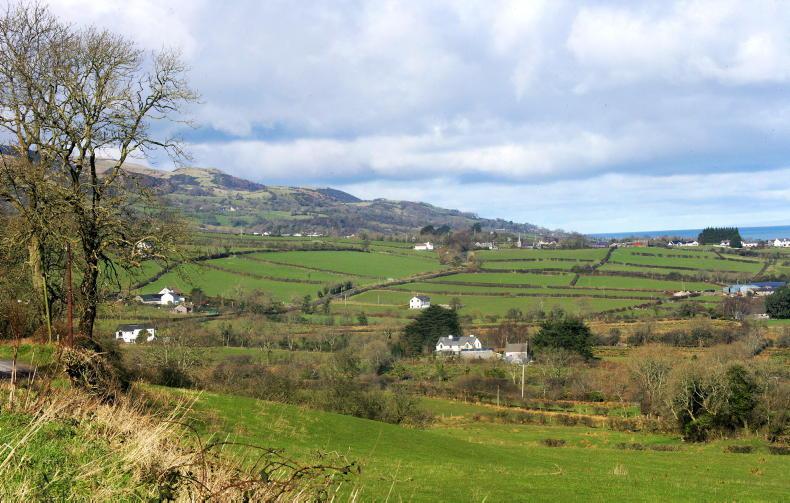Landowners should not sell carbon credits from their farms to other businesses, a leading land policy expert has advised.
Jeremy Moody from the Central Association of Agricultural Valuers (CAAV) said the suggestion that carbon credits could become a new income source for farmers is “a distraction”.

Jeremy Moody from the Central Association of Agricultural Valuers.
The concept of carbon credits involves farmers capturing carbon dioxide from the atmosphere through the likes of increasing organic matter levels in soils, planting trees and hedgerows, or re-wetting peatland.
This allows them to sell carbon credits to other businesses, which then use these credits to reduce their own greenhouse gas emissions on paper.
However, Moody is keen to point out that once a carbon credit is sold, the farmer cannot use it to lower their own greenhouse gas emissions from farming.
“If your milk or lamb purchaser comes to you and asks how you are moving to net zero, if you have sold away the low hanging fruit for almost nothing, you’ve made your work on delivering for your own business much harder,” he said.
In an interview with the Irish Farmers Journal, Moody stressed that farmers should play the long game when it comes to increasing carbon stores on their farms.
“We over-estimate what we can do for other people and we under-estimate what we have got to do for ourselves. You should see carbon as an investment, not as an output. If you are holding onto your carbon, that will support your business in 10- or 15-years’ time,” he said.
Future business
As previously outlined, stores of carbon on farms could potentially help lower the carbon footprint of farming activity.
However, Moody also thinks that lowering emissions will be important for doing business down the line.
He suggests that in the future, interest rates on loans from banks could be higher for farm businesses that have not made progress with reducing their carbon footprint.
“We are beginning to see that in the housing market,” he said.
Soil scheme
Looking at the farming industry in NI, Moody is “enormously supportive” of the new Soil Nutrient Health Scheme, where every farm can avail of free soil sampling and mapping to calculate the total carbon stored on each holding. “See this as an investment in the future, so you have control of your carbon. It is not something that you should sell like milk or lamb,” he said.
Although each devolved region of the UK is designing different farm support schemes, Moody sees a similar direction of travel across all regions. The most extreme change is happening in England, where the Basic Payment Scheme (BPS) will be phased out by 2027, to be replaced by schemes that mainly focus on delivering for the environment.
The plan in NI is different, as there will still be an area-based payment, known as the Farm Sustainability Payment, although it will be at a lower level than the current BPS.
Money will gradually be taken from the area payment budget to fund the headage schemes for sucklers and beef cattle and, eventually, a new agri environment scheme known as Farming With Nature.
“I struggle to see whether the Farm Sustainability Payment will be worth much to many people once new agri-environment schemes are fully in place,” Moody maintained.
The CAAV secretary and adviser points to DAERA guidance which states that the Farming With Nature package will eventually become the “central plank” of agricultural policy in NI. He said that while England is moving to environmental schemes much faster than the rest of the UK, all other regions are gradually heading that way too.
“There is a direction of travel. You can see the different horses going their own way down these roads. In the end, they may not be wildly dissimilar,” Moody said.
Landowners should not sell carbon credits from their farms to other businesses, a leading land policy expert has advised.
Jeremy Moody from the Central Association of Agricultural Valuers (CAAV) said the suggestion that carbon credits could become a new income source for farmers is “a distraction”.

Jeremy Moody from the Central Association of Agricultural Valuers.
The concept of carbon credits involves farmers capturing carbon dioxide from the atmosphere through the likes of increasing organic matter levels in soils, planting trees and hedgerows, or re-wetting peatland.
This allows them to sell carbon credits to other businesses, which then use these credits to reduce their own greenhouse gas emissions on paper.
However, Moody is keen to point out that once a carbon credit is sold, the farmer cannot use it to lower their own greenhouse gas emissions from farming.
“If your milk or lamb purchaser comes to you and asks how you are moving to net zero, if you have sold away the low hanging fruit for almost nothing, you’ve made your work on delivering for your own business much harder,” he said.
In an interview with the Irish Farmers Journal, Moody stressed that farmers should play the long game when it comes to increasing carbon stores on their farms.
“We over-estimate what we can do for other people and we under-estimate what we have got to do for ourselves. You should see carbon as an investment, not as an output. If you are holding onto your carbon, that will support your business in 10- or 15-years’ time,” he said.
Future business
As previously outlined, stores of carbon on farms could potentially help lower the carbon footprint of farming activity.
However, Moody also thinks that lowering emissions will be important for doing business down the line.
He suggests that in the future, interest rates on loans from banks could be higher for farm businesses that have not made progress with reducing their carbon footprint.
“We are beginning to see that in the housing market,” he said.
Soil scheme
Looking at the farming industry in NI, Moody is “enormously supportive” of the new Soil Nutrient Health Scheme, where every farm can avail of free soil sampling and mapping to calculate the total carbon stored on each holding. “See this as an investment in the future, so you have control of your carbon. It is not something that you should sell like milk or lamb,” he said.
Although each devolved region of the UK is designing different farm support schemes, Moody sees a similar direction of travel across all regions. The most extreme change is happening in England, where the Basic Payment Scheme (BPS) will be phased out by 2027, to be replaced by schemes that mainly focus on delivering for the environment.
The plan in NI is different, as there will still be an area-based payment, known as the Farm Sustainability Payment, although it will be at a lower level than the current BPS.
Money will gradually be taken from the area payment budget to fund the headage schemes for sucklers and beef cattle and, eventually, a new agri environment scheme known as Farming With Nature.
“I struggle to see whether the Farm Sustainability Payment will be worth much to many people once new agri-environment schemes are fully in place,” Moody maintained.
The CAAV secretary and adviser points to DAERA guidance which states that the Farming With Nature package will eventually become the “central plank” of agricultural policy in NI. He said that while England is moving to environmental schemes much faster than the rest of the UK, all other regions are gradually heading that way too.
“There is a direction of travel. You can see the different horses going their own way down these roads. In the end, they may not be wildly dissimilar,” Moody said.







 This is a subscriber-only article
This is a subscriber-only article











SHARING OPTIONS: